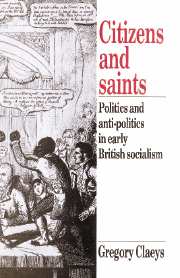Book contents
- Frontmatter
- Contents
- Acknowledgements
- List of Abbreviations
- Introduction:
- PART I THE ROOTS OF POLITICAL AND ANTIPOLITICAL SOCIALISM
- PART II SOCIAL SCIENCE, POLITY AND ECONOMY
- PART III THE ORIGINS OF SOCIAL RADICALISM
- 5 Owenism and the emergence of social radicalism, 1820–35
- 6 Owenism and Chartism, 1836–45
- 7 The legitimation of political socialism
- 8 Social radicalism, the state and revolution
- Bibliography
- Index
6 - Owenism and Chartism, 1836–45
Published online by Cambridge University Press: 04 December 2009
- Frontmatter
- Contents
- Acknowledgements
- List of Abbreviations
- Introduction:
- PART I THE ROOTS OF POLITICAL AND ANTIPOLITICAL SOCIALISM
- PART II SOCIAL SCIENCE, POLITY AND ECONOMY
- PART III THE ORIGINS OF SOCIAL RADICALISM
- 5 Owenism and the emergence of social radicalism, 1820–35
- 6 Owenism and Chartism, 1836–45
- 7 The legitimation of political socialism
- 8 Social radicalism, the state and revolution
- Bibliography
- Index
Summary
Any study of the relations between Owenism and Chartism is hampered by a variety of obstacles. Though easily susceptible to caricature, neither movement, in fact, was monolithic. Each spanned a considerable range of activities and embraced a broad spectrum of opinion. This was particularly true for the social and political theories debated within each camp. Though two ideals marked the extremity of views dividing the two groups – anti-Chartist Owenism on the one hand, ‘purely political’ Chartism on the other – the region between these incorporated a considerable range of political ideals, including various forms of liberalism and tory radicalism. Formidable historiographical gaps nonetheless inhibit our sense of the subtlety of opinion expressed in both movements. Given the absence of local studies of Owenism in particular, it is extremely difficult to offer an adequate taxonomy of variations in opinion, much less, among the shifting sands of popular participation on both sides, to account adequately for the processes underlying their origins and development. For despite the inspiring work of J. F. C. Harrison, Owenite studies remain far less developed than was the historiography of Chartism prior to Asa Briggs' edition of Chartist Studies (1962), which disclosed the rich variety of Chartist phenomena made accessible by detailed local studies. This has been succeeded in the last quarter century by a shelf load of excellent biographies, further local studies, general overviews of the subject, and methodological reconsiderations. These have shed very little light upon Chartist-Owenite relations in particular. But they have ensured that Chartism remains one of the best studied – and controversial – areas of British labour history.
- Type
- Chapter
- Information
- Citizens and SaintsPolitics and Anti-Politics in Early British Socialism, pp. 208 - 260Publisher: Cambridge University PressPrint publication year: 1989

